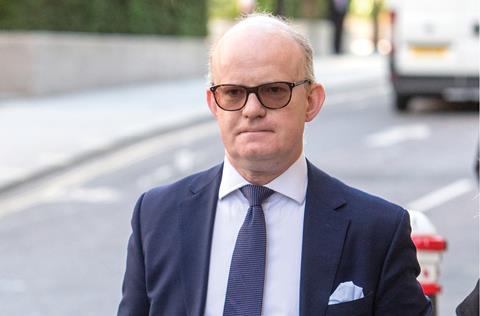Max Hill QC, the new director of public prosecutions, is to go back to his roots and spend a morning prosecuting in a magistrates’ court. Wisely, he won’t say where and when.
Staff at the Crown Prosecution Service (CPS) will welcome their boss’s attempt to understand the challenges they face. But the exercise will be realistic only if nobody in the CPS or at the court knows which cases he’ll be taking on. Then he might find out what it’s like to have the whole list put over until the afternoon.
It’s changed a bit since we were baby barristers 30 years ago, a head of chambers told him on Twitter. Another barrister advised him to ask a ‘second six’ pupil about the experience of being handed a pile of ill-prepared cases the night before.
‘I’d like to see him trying to get hold of the case-lawyer on the phone if something comes up,’ one lawyer said. But her colleague pointed out that, as DPP, he could hardly fall back on the CPS advocate’s usual excuse: ‘I don’t have the authority to take that decision.’
Hill disclosed his advocacy plan during the Kalisher Lecture he delivered to the Criminal Bar Association last week. But much of his speech was aimed over the heads of the lawyers present. He knows he has a major challenge ahead to raise and maintain morale among the 6,000 staff working for the CPS. At the same time, he has to build public confidence and trust. That means educating people about the role of the prosecution service.
And then there’s the question of resources. His entire lecture sounded like a shopping list. ‘We are demand-led,’ he said. ‘We don’t have a say in the cases we take on.’ Modern slavery cases had doubled in four years. The number of people tried in terrorist cases during 2017/18 was 39% up on the year before. And there had already been around 120 murders in London this year, many involving knives. If the police are given additional resource to investigate particular offences, he said, the CPS will need the resources to cope with additional prosecutions.

But Hill is treading a narrow line here. The most he will say is that the CPS cannot take more cuts. He will certainly put up a case to the Treasury for more money in the next spending round. But he is not prepared to say that he cannot deliver a good service within his existing resources.
Hill praises his predecessor Alison Saunders, who had to make staffing cuts of 30%. But she was a career civil servant who clearly felt it was her duty to maintain that everything in the garden was rosy – until a tearful farewell interview with the Observer in which she was reportedly scathing about ‘the lack of resourcing’. I sense that Hill will not fall into that trap – just as he is careful not to make assertions he cannot justify. Asked on the Today programme in January if it was possible there were innocent people in prison today because of disclosure failures by police and prosecutors in the past, Saunders said ‘I don’t think so’. Asked the same question last week, Hill replied: ‘it is impossible for me to know’.
Hill’s plan to get back to basics is not limited to a morning before the magistrates’ court. He wants the public to understand that the CPS does not investigate crime. That’s true, of course, except that prosecutors advise the police during investigations and send files back to detectives for further inquiries –so they do have a role in investigations.
He also wants people to know that the CPS does not choose which cases it considers. That’s equally true – but it does decide which cases it prosecutes.
And he wants the public to understand that it is not the role of the CPS to secure a conviction in every case. As he says, a conviction rate approaching 100% would signal an entirely risk-averse approach.
This is delicate territory but Hill can afford to be a little less cautious when he is told, as he was on the Today programme, that some rape complainants were being denied their ‘right’ to a prosecution. Nobody has such a right. People also need to be reminded that the aim of a criminal justice system is to provide justice for society as a whole and that it is wrong to prosecute if there is no realistic prospect of conviction.
Back, then, to his morning with the magistrates. He tells me he will be taking a list of first appearances in court. But he insists he will have no special privileges. ‘I have asked to be provided with nothing more than a prosecutor would get at the start of their career.’
And that, in some ways, is exactly what he is.
joshua@rozenberg.net



























3 Readers' comments